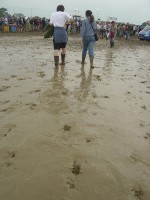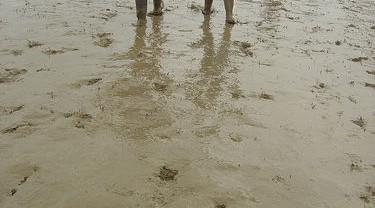 Glastonbury’s festival might be most famous for rock bands and endless seas of mud, but has also become one of the biggest gatherings of circus, variety and specialty acts in Britain and an important showcase for acts reaching out to new audiences. Martin McGrath spoke to some of our members who performed there this year about their experiences.
Glastonbury’s festival might be most famous for rock bands and endless seas of mud, but has also become one of the biggest gatherings of circus, variety and specialty acts in Britain and an important showcase for acts reaching out to new audiences. Martin McGrath spoke to some of our members who performed there this year about their experiences.
The range of acts putting on shows each year at Glastonbyr is enormous – from straight stand-up comedy to the wild fringes of modern circus and encompassing everything from burlesque to contortionists and every type of speciality act you can imagine, and a few you might not. Although the festival is generally recognised as an iconic site for rock music it has become, perhaps with the exception of the Edinburgh Festival, the largest concentration of club and circus entertainers in the United Kingdom each year.
Equity magazine talked to some of our members who were performing at the festival and asked them about their experiences and what the success of variety and circus acts at the festival might mean for others.
Bruce Airhead has a unique speciality act involving a giant rubber ball and precise comic timing. We asked him whether Glastonbury felt different from other gigs.
“Yes, because the people at Glastonbury are there to have a really good time. At some gigs you can tell some punters don’t want to be there or have other things on their minds. I have performed at other outdoor festivals but I like Glastonbury the most because of its size and the feeling of being part of a bigger group.”
Fraser Hooper is an award-winning clown who has been playing outdoor festivals in the UK and overseas for 18 years. He loves the different challenge presented by performing outdoors at a festival. “You have to make your own theatre, the audience has to be won and built and then kept. Without walls it’s much easier for them to walk away. With so much entertainment and so many people, getting an audience to sit through your whole act is an achievement in itself.”
Sally Miller is a contortionist who normally performs at corporate events and product launches. “Glastonbury is such a great festival, I get to see lots of other acts when I’m not performing. The whole production crew in the Circus Big Top were fantastic and it’s a great place to perform.”
It’s also the opportunity to work before a very different type of audience.
“They are very enthusiastic, open and much more free than other crowds,” says Fraser.
Anton and Dave perform walkabout comedy together as The2Men taking on a range of characters that include an unlikely duo of traffic wardens. They agree that the atmosphere is different at the festival. “We get to perform before a much wider variety of people at Glastonbury and anything goes. We can say and do far more outrageous things at Glastonbury than we would do anywhere else.”
There’s been a great deal of pressure on traditional variety performers – venues are closing and many acts are reporting that work is getting harder to find. Has branching out into alternative venues like Glastonbury made it easier to find work?
“I have not really performed very much in the more traditional settings such as travelling circuses because I have always focused more on corporate events,” says Sally the contortionist. “But I have found more and more circus artists entering the corporate scene and that means that I am having to work a little harder to make sure I am consistently getting work. But it is still there if you work hard enough, have a good skill level and a good act with strong promotional material.”
Fraser Hooper has worked all over the world and believes that work generates work, but admits for those not willing to travel as much, opportunities are more limited. “Good work can take years to perfect and if you are producing new shows every one or two years you will find a market in this country but it probably won’t travel much further, make you a better performer or give you a longer career. However if you don’t change what you do your work can go stale and isn’t worth booking. Too much travelling can also be hard but if you stay in one spot your profile falls. So I think the answer is yes it is harder but partly because as I become more experienced I’ve started to make choices that suit my lifestyle.”
All the performers believed that the reaction of audiences at Glastonbury demonstrated that when people have the opportunity to watch high-quality circus and variety acts they will respond positively and even demand more. “The crowds here are great, the techies are great and even if the mud is a bit rubbish the whole festival has a great feel to it,” says Bruce Airhead. “I believe if more people see our type of shows at places like this then bookings will increase.”
“Variety is alive and well in this country,” says Fraser Hooper. “There are many great artists and many great outdoor festivals but as a clown I often get treated better in mainland Europe than I do here and many European artist simply cross the UK off as a bad experience. The audiences here though are the toughest and the best for sharpening your material. We have seen a lot and our tradition is strong. There are a lot more training opportunities now and this is producing some great talent in this country, we just need to do more to look after what we have.”
“The more versatile your performance is, the wider the scope of people you’re work can appeal to,” say Anton and Dave. “We are always optimistic, walkabout is only really limited by your imagination and although we have set pieces that we do, we also love to improvise – it makes the performance fresh for us and also unique for that moment.”
Finally, then, is there anything that traditional venues could learn from Glastonbury to appeal to a wider audience? Fraser Hooper has a suggestion: “Bring in a bit of mud, loads of food from around the world and add the strong smell of poo.”
Perhaps traditional venues do still have things going for them after all.
JOINING THE FESTIVITIES
Haggis McLeod, a long-time Equity member, organizes the theatre, variety and circus fields at Glastonbury. We spoke to him about the work he does.
Glastonbury is most famous as a rock festival, but it also encompasses other forms of entertainment – burlesque, circus and variety. How did you end up diversifying so widely?
Glastonbury has always strived to be more than just a rock festival and in the early eighties a theatre tent was introduced to offer a diversion from the musical acts on the main stage. From the success of that venue it quickly became clear that there was a huge wealth of performers who wanted to appear at the festival and an audience of music fans who were keen to enjoy the alternative entertainment.
My wife Arabella Churchill, who sadly died late last year, was responsible for instigating, not only the first kidz area and the first theatre tent, but also the circus big top and the masses of street theatre acts from all over the world that congregate in the fields of Somerset every summer.
The theatre and circus area now produces more than 1200 shows over the three days and many festival goers admit to spending most of their days enjoying our fields .
What do you think the circus and variety acts bring to the festival?
These areas offer the chance to experience a wide range of theatre, dance, cabaret, circus, poetry and much, much more. For most artists it is the biggest gathering of their year and a chance to catch up with old friends and meet some of the up-and-coming talent.
Is there a particular type of act that does especially well at Glastonbury? Do you think they need to change the way they perform for a Glastonbury audience?
For me some of the best shows are to be found on the fields themselves. A good outdoor act can attract an audience of over 500 people seated all around them in a circle. For me, the energy created is almost tangible.
Acts may change their performance to suit the weather or when having to work with limited technical support but the constant thing they all experience is the public suffering from audience fatigue. It can be observed that the best reaction to the shows is on the Friday when the public are fresh and full of energy. By the Sunday the venues are just as full yet the reactions and responses from the crowds often much less. Sated with pleasure, they seem just happy to still be at the festival.
The performance areas for the variety acts at Glastonbury always seem to attract a large number of visitors while traditional venues (pubs/clubs/circuses) are having a hard time. Does Glastonbury prove there’s an untapped audience for this kind of entertainment?
The attraction of live performance has always existed. Unfortunately the advent of cinema and television meant that many smaller venues found it hard to find an audience and were forced to close. Without venues to perform in, the acts too soon went out of business. I think the success of performance art at Glastonbury proves not only that there is an audience out there but also that there are some great acts to be seen.
What is the process for selecting acts at Glastonbury?
Because of Glastonbury’s high profile, we are annually inundated with requests from artists who want to perform at the festival. Once we explain that because the festival is basically a charity event and that we pay accordingly, many refuse to drop their prices. Their loss. Other acts come back year after year, some with old material, some with new shows and we also strongly rely on word of mouth recommendation.
Is there any act you haven’t been able to feature that you’d like to?
Yes lots, some don’t want to come because they don’t seem to be “natural campers”, some acts can’t operate on anything but solid floors and some acts are more than we could afford. There are some terrific large scale shows out there, I particularly like Cirque Royal du Luxe, Circus Baobab and the theatre company Spymonkey.
Do you have a favourite circus or variety act that you’ve seen at Glastonbury?
Without a shadow of a doubt one of the most consistently impressive acts we have ever had is the Black Eagles acrobatic troupe from Tanzania. Several years ago we had a group called the Happy Sideshow from Australia. No other act has ever caused an audience member to faint in admiration, or maybe it was shock, I’m not sure.
